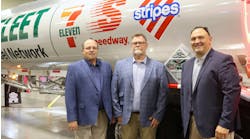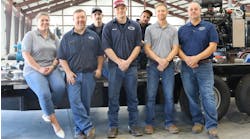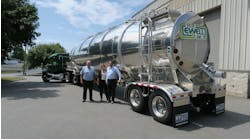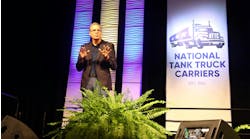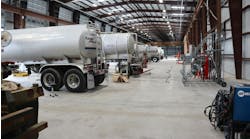John P. Faris Jr. didn’t know what he was leaping into more than 40 years ago, when he left his comfortable job as a community banker and plunged into business ownership with the purchase of Oilmen’s Equipment Company.
But he was smart enough to seize an opportune moment before it slipped away.
“I had no idea a company like Oilmen’s even existed,” Faris, now semi-retired, recalled. “I had never heard of such a thing. So I went in cold turkey. Except, through my experience at the bank, I had learned to read an income statement pretty well. And once (previous owner R.E.) Littlejohn shared five years’ worth of financial data, I knew it’d be a great fit.”
The new business owner then grew Oilmen’s—which was founded in 1951—from a small tank truck marketing company with 14 employees into the largest dealer of new and used straight tank trucks, or tank wagons, in North America, with more than 100 employees, before selling it to current owner and president Trey Hill, his nephew.
They finished a five-year ownership transition last December—just in time for Hill to oversee the company’s 70th year in business.
“I’m so grateful that we can talk about a 70th anniversary,” Faris said. “I’m proud of it, but also very humbled by it. I’ve seen businesses friends of mine owned that didn’t make it through this COVID thing, and that disturbs me a lot, because I think it was unnecessary in a lot of cases; and a lot of places are bought and sold by people who aren’t happy with the results. So we’re blessed to have a tremendous future ahead of us.
“We’ve got great people, Trey’s doing a great job, and has been for a long time. It’s the perfect story—and it’s been a great ride.”
Challenge accepted
The journey began after Faris bought Oilmen’s in 1978.
At the time, the business primarily was the sales arm for another Littlejohn-owned operation that produced tank trucks, and the two companies shared a building in Spartanburg, S.C., about 80 miles west of Charlotte. But soon after Faris bought Oilmen’s, Littlejohn sold the sister company in a surprise move, so Faris purchased an adjacent property and erected a new building next door. The two companies still are neighbors, with the other now operating as a PSC service center owned by Engineered Transportation International.
“That was pretty challenging for a little while there, but we made it through, and as our business has grown, we’ve added onto the building, and added people,” Faris said.
Oilmen’s survived, and thrived, by adapting to new circumstances. Established as a distributor of petroleum equipment, the company quickly learned to produce its own tank trucks, while also growing its sales and service capabilities. Then, in 1986, Faris established three subsidiaries as distinct divisions of Oilmen’s Equipment Corporation: Oilmen’s Truck Tanks, OEC Fluid Handling, and OEC Petroleum Systems.
Truck Tanks builds, sells, and repairs tank trucks, and sells related parts; Fluid Handling is the corporations’ industrial sales and distribution arm; and Petroleum Systems distributes petroleum dispensing equipment to service stations.
Hill joined Oilmen’s in 2000. At the time, he was at a crossroads in his life, so he reached out to his business-savvy uncle for advice on what to do next. Then Faris revealed he was looking for help running Oilmen’s—and made an offer Hill astutely accepted. He quickly rose to president, while continuing to help grow the business, and bolster Faris’ confidence the company would be in good hands when he retired.
Now Faris, who still sells tank trucks, can rest easy, knowing Oilmen’s will roll on as a family-owned operation.
“That’s the cherry on the top because we have a ton of people who’ve been here years,” Faris said. “We’re like a big ol’ family, so to be able to transition it to somebody who you worked with for 20 years, are crazy about, and get along with, has been great. I can stay here and do what I enjoy doing, which is selling, and have somebody else take over responsibility for the company. Everybody loves Trey and respects him, so it’s a perfect fit.”
Collaborative production
The building hasn’t always fit Oilmen’s business, so it has undergone six expansions and now boasts 60,000 square feet of production space on the 22-acre Spartanburg property. Tank trucks are assembled in 20 bays inside the building’s R-stamp weld shop, then transferred to the “meter” shop, where tanks are tested for leaks, pumping equipment is calibrated, and each new unit is certified to Oilmen’s standards.
The company turns out 300 to 400 trucks per year, depending on their size and complexity.
“It’s a collaborative sales process,” Hill said. “There isn’t a cookie-cutter truck. So with each one we build, there are a lot of conversations, and a lot of listening that goes into the design process, to understand what our customers need. Then we try our best to bring our experience and expertise to bear, to provide a solution that works.”
Oilmen’s custom fabricates some equipment, like truck cabinets and hand-rail systems, but primarily focuses on assembling and upfitting its premium tank wagons. Aluminum tank shells come from Almac (part of the Platinum Tank Group) and TransTech, and Mid-State Tank supplies stainless steel tanks for Oilmen’s.
The company also is a licensed truck dealer offering Peterbilt, Kenworth, Freightliner, Western Star, Volvo, Mack, and International trucks, depending on equipment specifications, and customer preference. “We also are very open to our customers supplying their own trucks, because of the relationships that they have,” Hill said. “So it doesn’t have to exclusively be trucks we provide, but sometimes the convenience of us providing that truck is important, because it’s already spec’d correctly and available.”
Trucks range in size from medium-duty, like an F-550 chassis cab, to tandem and tri-axle chassis; and tanks range from 500 to 6,000 gallons. And while Oilmen’s specializes in tank wagons, it also equips and sells diesel exhaust fluid (DEF) tank trailers. “We’ve also worked hard to develop products that use van bodies, primarily for customers in the lubricants market,” Hill said. “They can put totes of lubricant in the vans for delivery, and then use our built-in pumping systems that allow customers to pump product out of the totes.”
Oilmen’s most traditional clients are jobbers, but their tank trucks now are used by a variety of customers in the fuel and oil distribution industry, and beyond. “We’re really focused on what our customers want, and so our units, for the most part, are custom built,” Hill said. “We make units that are designed to deliver bulk oil, and still offer some units used for delivering home heating oil. We’ve also branched out into the waste oil industry … and the delivery of certain chemicals, like diesel exhaust fluid, and we really worked hard in the early stages of (DEF introduction) to become a leader in DEF tank delivery.
“We’re also involved in anti-freeze delivery, as well as windshield washer fluid delivery, and we build trucks for transporting potable and non-potable water.”
As a nationwide parts supplier, Oilmen’s also sells ancillary tank truck equipment, including Blackmer pumps, Liquid Controls meters and Hannay hose reels. “We have one of the largest inventories in the country of pumps, meters, and reels, and we can custom cut and couple all different size hoses and ship them out wherever they need to go,” Hill said. “And we’re proud of the relationships we have with our suppliers. We have some very long-term relationships with, basically, the premium brands in our industry.”
Platinum performance
Those relationships helped make Oilmen’s a provider of premium tank trucks.
And the commitment of its leaders—from Littlejohn, to Faris, and Hill—to equipment innovation, product quality, and pre- and post-sale service has provided 70 years of family-owned prosperity, even through industry consolidation, and a global pandemic that brought many other businesses to their knees.
“We had enough inventory and backlog to be able to keep all of our people working, and I was very grateful to be able to do that, and to provide product to our customers,” said Hill, whose operation was deemed essential. “And our business level is back to where we were pre-COVID, so we’re very fortunate.”
They’re not, however, satisfied. As Hill works to line up the next generation of family leadership, he continues looking for ways to improve the business. In today’s world, that often involves streamlining processes with technology, so Oilmen’s recently moved its production-oriented items to a database-driven system built in-house, with apps that pull data in real time. It also is in the process of moving its back-office system, powered by Epicor’s Prophet 21, to the cloud; and soon will unveil a new e-store through oilmens.com.
“That’s a new offering that will allow our customers to interact digitally with our parts counter,” Hill said. “We already have an expert staff answering calls from all over the country, helping people decide what they need, and shipping out the same day, so we’re expanding by leveraging technology to help us do that 24 hours a day.”
Twenty-four hours a day, seven days a week, 365 days a year—and, with a little luck, another seven decades of tank truck services.
“This anniversary is significant for a couple reasons. No. 1, not many companies can say they’ve been around for 70 years, so that’s quite rare,” Hill said. “It’s also special because, as individuals and as an organization, we’re standing on the shoulders of those folks who came before us, so it’s a tribute to our history, and the people who built our company to where it is—and it’s an honor to continue to grow and serve our customers.”
